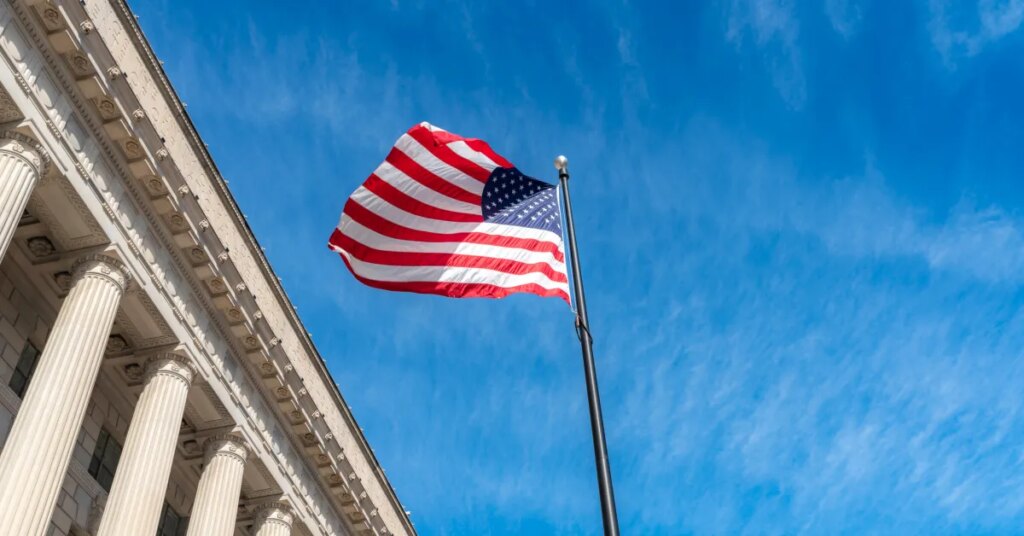This year, the United States military is celebrating its 250th anniversary—two and a half centuries of Americans making the immense sacrifice to defend our fundamental freedoms and uphold the promise of self-governance at home and around the globe. As we commemorate this milestone, the least we can do is ensure that those who serve and their families can continue to participate freely and fairly in our elections.
[time-brightcove not-tgx=”true”]
However, the Supreme Court of the United States has agreed to hear a case that could put military members’ ability to vote, and to participate in the democracy they fight hard to defend, at risk.
The case of Watson v. Republican National Committee challenges a Mississippi law which allows mail-in ballots postmarked by Election Day to be counted, so long as they arrive within five business days. Over two dozen other states have similar laws which provide flexibility for military members voting from overseas. Now, the case before the SCOTUS could impact these servicemembers—and disrupt a long American tradition of military voting.
For more than 150 years, America has enabled troops stationed far from home to cast their ballots. The first large-scale use of absentee voting dates back to the Civil War, when 19 Union states passed laws allowing soldiers to vote from the battlefield. That year, roughly 150,000 soldiers exercised their freedom to vote from the front lines of the war.
Today’s battlefields and the technology may have changed, but the principle remains the same. Our service members are stationed around the world—from ships at sea to bases in Europe, Asia, and the Middle East. These voters, including active-duty military personnel, their families, and civilians working on base, must navigate a unique set of barriers to voting from abroad, ranging from frequent relocations to limited access to mail systems to the need to protect sensitive personal information.
At the same time, these voters must also follow strict procedures set by their respective “home-of-record” states to ensure their votes remain secure.
Historically, state and federal leaders have worked collaboratively to overcome these barriers. The Soldier Voting Act of 1942 and the Federal Voting Assistance Act of 1955 required states to send ballots to military service members, but there was no standardized system in place. In 1986, Congress addressed this problem with the Uniformed and Overseas Citizens Absentee Voting Act (UOCAVA). UOCAVA created a set of standardized tools to enable a more uniform and secure process for military voting. In 2009, Congress strengthened these protections by requiring ballots to be sent at least 45 days before federal elections and mandating that ballots be available electronically.
Over the past few years, however, this once-unifying issue has been pulled into the political crossfire. Existing, well-established laws designed to protect military voters have been caught in a web of litigation, ill-conceived state laws, an executive order, and changes to federal policy that altogether make it harder for military voters and their families to participate in American elections. States such as Arizona, Indiana, North Carolina, Tennessee, and Texas have proposed new barriers to mail-in voting processes—and by extension, to overseas and military voters—through burdensome proof-of-citizenship requirements and narrow residency requirements for voting by mail. None of these bills passed in 2025, but efforts to restrict mail-in voting continue today.
North Carolina offers a cautionary tale of just how at-risk military and overseas voters are today. State supreme court candidate Judge Jefferson Griffin demanded that courts throw out 1,675 valid military and overseas votes in a contentious legal battle over his narrow loss in the 2024 Supreme Court election. Griffin’s lawsuit challenged ballots cast by military and overseas voters, even though they had followed state law when they registered to vote and cast their ballots. While Griffin eventually conceded, his efforts to invalidate these votes cast doubt on the system that ensures American men and women serving our country overseas have a voice in our democracy back home.
Here’s the truth: military and overseas voting is how military families have always had their votes count, and it’s safe, secure, and trustworthy. Every voter must prove they’re a qualified U.S. citizen and provide personal identification, such as their date of birth, Social Security number, and driver’s license number. Meanwhile, a bipartisan team of election officials checks every voter’s eligibility and confirms their identity through additional steps, such as signature matching—all while protecting ballot privacy.
Our system for military voting is strong. Still, military families deserve improvements, and states are already leading the way. Thirty-one states now offer secure electronic ballot return options, allowing military and overseas voters to submit their ballots online. Given the challenges of international mail, 29 states count military voters’ ballots postmarked by Election Day but received a few days after the election. States such as California, Colorado, Georgia, and South Dakota have also established clear, uniform rules, ensuring that military members and their families can exercise their freedom to vote, even if they were born abroad.
Whether serving in the Army, Navy, Air Force, Marine Corps, Coast Guard, or Space Force, every service member takes an oath to protect our Constitution. By making it harder for military members and their families to vote, we are undermining the very ideals they’ve sworn to defend.
These brave men and women in uniform understand better than anyone that voting isn’t something we can take for granted. We must send a loud and clear message to our elected leaders that protecting this longstanding American tradition isn’t just common sense—it’s their patriotic duty as Americans.
The post Military Voting is an American Tradition. Let’s Keep It That Way appeared first on TIME.




